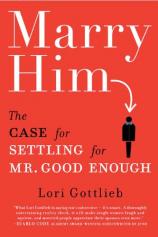Reading Group Guide
Discussion Questions
Marry Him: The Case for Settling for Mr. Good Enough

1. In the prologue, Lori Gottlieb realizes that while she’d never made an actual list of qualities she was looking for in a guy, she did have a very specific unconscious checklist in her head. Do you have a list --- a physical one or a mental one --- of your ideal mate? What would be on your list?
2. Has your “list” from question 1 changed over your lifetime? Are all of the current qualities realistic --- or statistically likely --- in one person?
3. Do you have a “type”? Is your type consistent with the qualities you consciously look for? Do you run into the same relationship-ending problems repeatedly?
4. What does “husband material” mean to you? Do you think “tall, dark, and handsome” or “long-term compatible”? How have any of your previous dates measured up to your ideal?
5. What does “settling” mean to you? Would you settle for nice life with a nice guy? Why or why not? Do you settle or compromise in other areas of your life? Where’s the line for you between making a realistic compromise and settling for something that’s beneath you?
6. What does “true love” mean to you? Do you believe in a soul mate? Have you ever thought you’d met your soul mate before but later changed your mind? What do you think of Rabbi David Wolpe’s interpretation of “soul mate” in chapter 23?
7. In chapter 3, Lori Gottlieb describes how feminist ideals led her to mix up her priorities when it came to dating, and how the idea of “empowerment” led her away from what she truly wanted. Do you agree that feminist ideals --- when applied to dating --- have had an e impact on women’s overall relationship happiness? Do you think women often confuse what they actually want with what a modern woman is supposed to want? What does “having it all” mean to you?
8. Of the qualities you desire from question 1, why are these important to you? Can you separate these qualities into “needs” and “wants,” as Lori does in the book?
9. One man in the book says that women expect “one-stop shopping” --- a mate who fulfills them across the board --- but that he thinks one-stop shopping is overrated because he can get some needs met by his wife, some by his colleagues, and some by friends and family. Do you think women have more expectations in relationships than men? If yes, how? Do you think women, more often than men, focus on the negative in their dates/significant others rather than the positive? If so, why?
10. In chapter 10, Gottlieb recounts social scientist Barry Schwartz’s description of maximizers and satisficers. Are you a maximizer in dating? In other areas of your life?
11. Have you ever dismissed a guy after a first date that was fine, but had no sparks? Do you think you worry too much about instant chemistry or common interests instead of about common goals and values?
12. Why do you think it is so difficult to let go of the ideal guy and be less picky in practice?
13. In one of Lori’s sessions with Evan, the dating coach, he asks her to write down all the ways someone would have to compromise to be with her and she lists her less-than-appealing qualities for which some guy would have to compromise. What not-so-appealing aspects would a guy have to put up with to spend his life with you? (Be honest!) Would you make these kinds of compromises to be with a guy, or would you rule him out and go for someone “better”?
14. Chapter 19 discusses the Westerner-idea of “falling in love” vs. love developed over time in arranged marriages. Do you believe you can “fall in love” with someone after, instead of before, marriage? What “practical” factors should women take into account when looking for a spouse? Is it okay if he’s a sexy artist but makes no money? If he’s stable and loyal but short and bald?
15. Do you think expectations for marriage have changed from generation to generation? If so, discuss how and what causes these differences. In an era when women no longer need a man for financial support or even to have a child, what do you think a husband is for nowadays and why do you want one?
16. In the book, Lori makes a lot of assumptions about potential dates based on their Match.com profiles, but later ends up dating a guy she was initially reluctant to e-mail. If you’ve tried online dating, have your experiences been similar to Lori’s? What assumptions do you make about men based on their online profile essays or photos? How accurate do you think those assumptions are?
17. How did it make you feel to read about the realities of dating as women age and the “reverse power curve” for men and women? Lori says she was in denial --- that she knew dating got harder, but was still convinced that she wouldn’t fall through the marital cracks. Do you think you take into account these realities, or do you think that no matter how old you are, you’ll still be desirable to the men who interest you?
18. Have you ever fallen for an “alpha male”? What’s attractive about men like this? Have you ever dated someone who was less ambitious or successful than you are? How did you feel about that?
19. What is your own personal “chemistry-to-compatibility ratio” --- as described in chapter 20? What did you think of the studies by scientists Martie Haselton and Helen Fisher on the biological factors involved in feeling “chemistry”? Have you ever noticed a pattern in which you’ve mistaken “chemistry” for a dysfunctional attraction?
20. Were you surprised by the studies that researcher Paul Amato discusses in “The Good Enough Marriage” (chapter 22)? Would you be satisfied in a “good enough” marriage or, like some of the women he mentions, would you get divorced and look for something better? How likely do you think it would be for you to find something better than “good enough”?
21. Of the women who tell their stories at the end of the book, to whom do you most relate and why? Have you ever found yourself in a similar situation and, if so, how did you handle it?
22. After reading Marry Him, are there any changes you might make in your approach to dating or relationships? Have you realized anything about what you want and what might make you happy in the long-term that you weren’t aware of before? If so, what? Has your idea of “Mr. Right” changed at all?
Marry Him: The Case for Settling for Mr. Good Enough
- Publication Date: February 4, 2010
- Hardcover: 336 pages
- Publisher: Dutton Adult
- ISBN-10: 0525951512
- ISBN-13: 9780525951513








